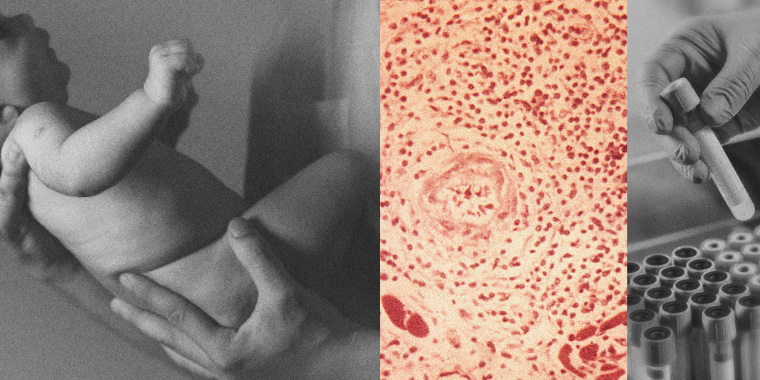THERE HAS BEEN A REPUBLICAN EFFORT TO PREVENT CHILDREN FROM RECEIVING SEX EDUCATION IN SCHOOLS. PERPETUATING IGNORANCE IS NOT A SOLUTION TO PREVENT SEXUAL DISEASES, SOME WITH CATASTROPHIC CONSEQUENCES. ALL CHILDREN NEED KNOWLEDGE & HEALTH CARE.
Mississippi hit by 900% increase in newborns treated for syphilis

JACKSON, Miss. — The number of babies in Mississippi being treated for congenital syphilis has jumped by more than 900% over five years, uprooting the progress the nation’s poorest state had made in nearly quashing what experts say is an avoidable public health crisis. The rise in cases has placed newborns at further risk of life-threatening harm in a state that’s already home to the nation’s worst infant mortality rate.
In 2021, 102 newborns in Mississippi were treated for the sexually transmitted disease, up from 10 in 2016, according to an analysis of hospital billing data shared by Dr. Thomas Dobbs, the medical director for the Mississippi State Department of Health’s Crossroads Clinic in Jackson, which focuses on sexually transmitted infections.
Dobbs, the state’s former health officer, said he’s spoken with health care providers who “are absolutely horrified” that babies are being born with the disease, and in rare instances dying from it.
“This seems like something that should have happened a hundred years ago, not last year,” said Dobbs, who is also dean of the John D. Bower School of Population Health at the University of Mississippi Medical Center. “There’s really kind of a shock.”
The Mississippi State Department of Health does not formally track congenital syphilis deaths but said there was at least one baby who died in 2021.
Congenital syphilis occurs when the infection is passed from a mother to her child while she’s pregnant. If untreated, a pregnant woman with syphilis has an 80% chance of passing it to her baby.
Babies infected with syphilis may not initially show symptoms, but for those who are not treated within three months of birth, complications can be severe. Syphilis can damage a baby’s organs. The disease can pummel a child’s nervous system and imperil their vision and hearing. In the gravest cases, newborns die.
The 2021 figures Dobbs shared are the latest indicator of a growing congenital syphilis problem in Mississippi, and nationwide. Preliminary data from the Centers for Disease Control and Prevention shows that cases across the U.S. have more than doubled from 941 in 2017 to at least 2,677 in 2021.
In Mississippi, the Department of Health has not released its final 2021 numbers — which are based on clinicians reporting cases directly to the state — but the preliminary numbers mirror the increase Dobbs found based on insurance billing codes, said Dr. Paul Byers, the state’s epidemiologist.
The resurgence also shows how the state’s racial disparities can be present from the first day of life. In 2020, Black newborns accounted for 70% of the state’s congenital syphilis cases, despite making up about 42% of the state’s live births that year. Byers said in a statement that he expects similar disparities in the state’s final 2021 data.
Congenital syphilis cases can be prevented if the mother receives a series of penicillin shots at least a month before giving birth. When a mother hasn’t been treated adequately, infants usually must remain in the hospital for two weeks after birth, as penicillin is delivered intravenously.
For a growing number of Mississippi moms and their children, treatment is not happening in time.
Some counties in the state lack an obstetrician, which means pregnant residents must travel for care. Depending on their job, time away from work means lost income, while unreliable transportation might cause a patient to miss appointments. And many pregnant Mississippians have to wait weeks before their first prenatal visit; last year, it took about a month on average for applicants to be approved for a public health insurance program through Medicaid that covers most pregnancies in the state.
No comments:
Post a Comment
Note: Only a member of this blog may post a comment.